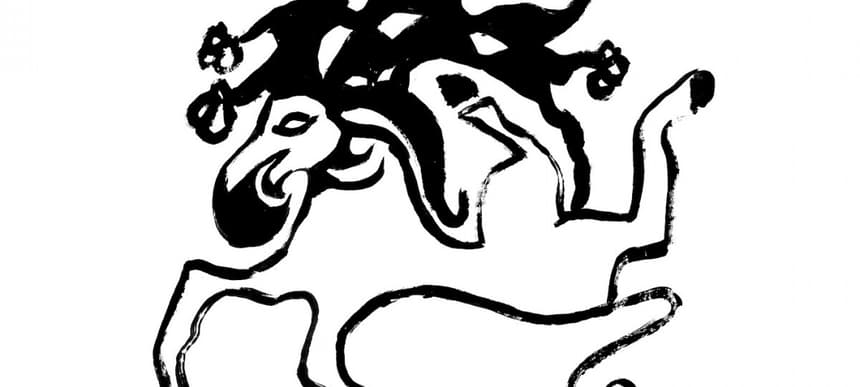
The Art Of Noise: Sami Baha
Having left his increasingly turbulent home of Istanbul, the now London-based, half-Egyptian artist Sami Baha has quickly garnered a reputation for his carefully honed Trap instrumentals. His characteristic, stylised productions delicately layer complex Eastern melodies, abstracted vocal samples and trap elements, placing onus on the spaces between.
Despite previously focusing on complex melodic arrangements, he has since started working with more vocalists whilst he’s been in the UK, and has been championed by the likes of J-Cush with guest spots on both Rinse FM and Circadian Rhythms on NTS Radio.
The evolution of the young producer’s debut EP, ’Mavericks’ began while he was back in his hometown as its political situation worsened: ”The music I produced became more chaotic as Istanbul became a harsher place both politically and economically.” He says. “I didn’t really design it that way, but I feel like the sound got more aggressive over the years.”
With roots in the Turkish hip hop scene, Baha self-describes his music as ‘instrumental trap’. “I grew up when the Arabic style of Turkish music known as Arabesk was at the centre stage of Turkish culture.” He explains. “I was listening to popular Turkish performers Ibrahim Tatlises and Muslum Gurses, alongside Trap originators DJ Screw and the Atlanta scene. I know people don’t hear the Orient instruments and rhythms in my music, but I like to think of my music as Arabesk-Trap, as I think the Arabesk and trap crossover is where they come from and in their feel.”
As much as his heritage affects his music, the reference points for his artwork has also drawn inspiration from his background: “I was on a search for a symbol rather than an artwork. In the end, we decided on this horse-lion-eagle tattoo found on a Hun warrior’s mummy, which is exhibited in Hermitage Museum in Russia.” He explains. “A gryphon is a combination of a lion, king of beasts and an eagle, monarch of air: watchful, loyal, rapacious, even gentle. Arguably it originates from Egypt. The final version for the album is much more simplified and redrawn with a brush.”
“Beyza [Ucak] looked at computer games, modern revolutionary graphics and central Asian imagery from pre-Islamic times…I wanted to stay away from hyper-real visuals. It’s black ink only.”
Aesthetically, the EP artwork for ‘Mavericks’ is unique in that every track on the record bears its own design, using a conceptual link based on imaginary guerrilla organisations. “They’re all logos of imaginary guerrilla groups and represent each track. “Beyza [Ucak] looked at computer games, modern revolutionary graphics and central Asian imagery from pre-Islamic times…I wanted to stay away from hyper-real visuals. It’s black ink only.”

The political climate was something that strongly affected through both their work and personal life: “The Middle East has a long history of counter attacks to the authority, be it a coup d’état or a revolutionary-turned-terrorist groups.” says Ucak. “After a while it’s hard to draw the line between the army and a rebellious group conceptually nor visually, as they are part the same military aesthetic. We live in a branding obsessed world, so to look at branding in the context of agitation and discovering a repetitive rushed and raw visual aesthetic inspired us a lot, especially as gamers. We wanted to tell a story with a visual language for tracks, making them imaginary guerrilla forces fighting with ‘The Mavericks’.”
“I’m eager to see what will the democratisation of the computers and online sharing is going to do to popular music and culture in Turkey.”
Inevitably, Baha also sees it as something that has infiltrated the city’s musical scene. “I am not involved with a political organisation but as a civilian living in Istanbul, I was on the streets during the two week struggle with the violent police forces and the occupation of the Gezi Park,” he explains. “Especially non labour and the non-Kurdish majority ignored the tension between the people and the government, as long as they could. Especially since 2013, protests, censorship and bans, followed by legal battles and political scandals created a vicious circle, which made it a matter of survival to be engaged with politics on a daily basis.”
The changes in the environment have brought about the rise of Arabesk rap, something previously not taken as seriously: “I think the unemployment and the debt that is semi-invisible now because of the constant political noise in Turkey, will be impossible to ignore soon. These harsh conditions and internet already affects Turkish music, creating serious YouTube hits out of Arabesk rap – a music genre that’s still found ridiculous as its ancestor Arabesk was in the 80s.” He explains. “I’m eager to see what will the democratisation of the computers and online sharing is going to do to popular music and culture in Turkey. Personally, I felt like I couldn’t live in there anymore because the music industry couldn’t financially feed the electronic scene which can be elitist and conservative about music genres.”
‘Mavericks’ is out April 1st on Planet Mu (pre-order).













